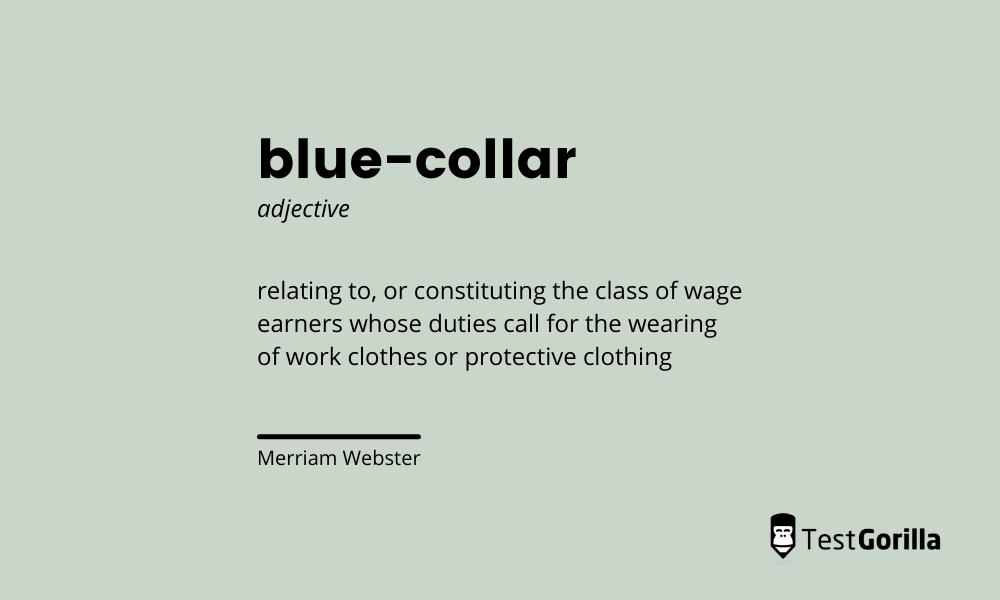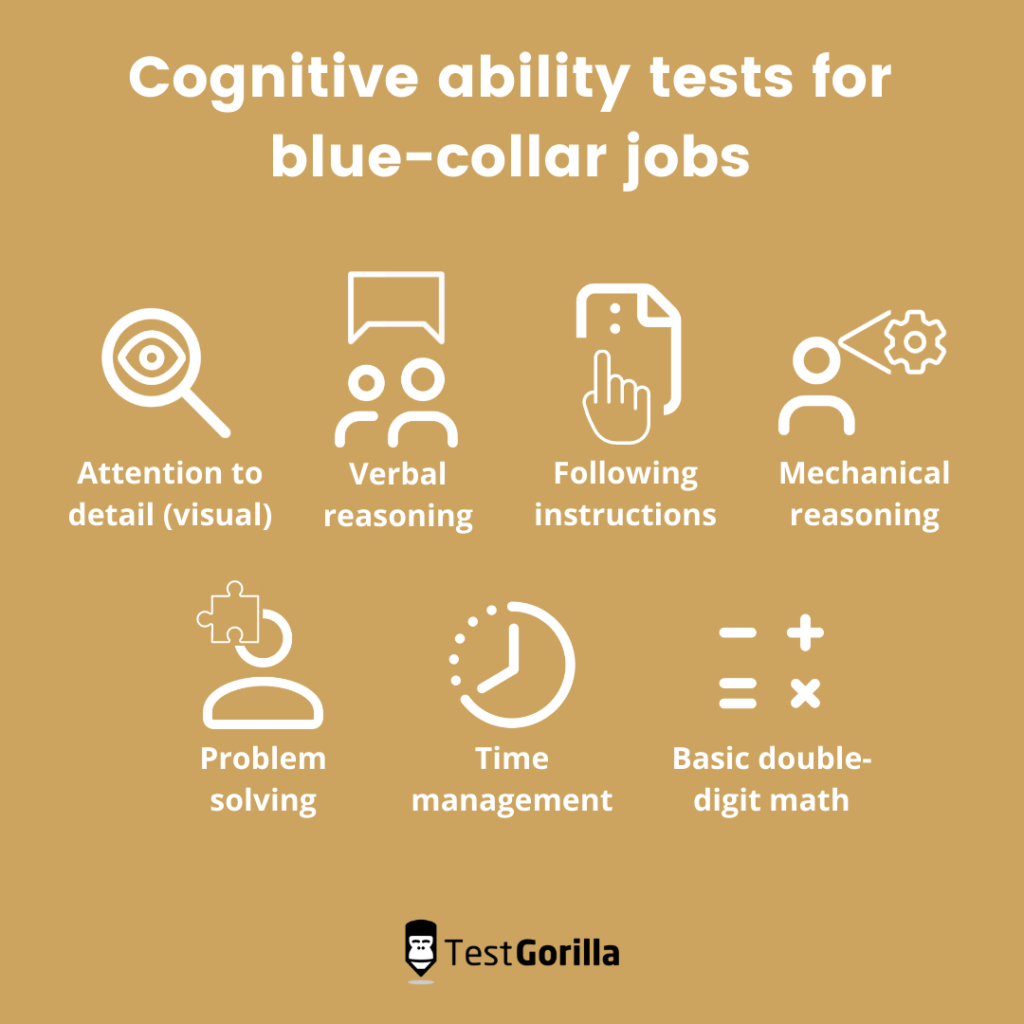Table of contents
- What are the different types of pre-employment assessments for blue-collar jobs?
- Why are pre-employment skills tests useful for blue-collar jobs?
- What are the disadvantages of pre-employment tests for blue-collar jobs?
- What are some examples of pre-employment tests for blue-collar jobs?
- How do you use pre-employment assessments for blue-collar jobs?
- For which types of blue-collar jobs does it make sense to use skills tests?
- For successful blue-collar hiring, you need the right mix of hiring methods and tools
Pre-employment assessments are an increasingly popular HR tool. Companies use them not only because they make evaluating many candidates bias-free and manageable but also because they significantly reduce per-hire costs and time.
Despite its benefits, skill-testing for blue-collar roles has remained relatively uncommon. As most blue-collar jobs involve manual labor instead of office work, businesses feel there’s little to no value in remotely assessing applicants for such positions. But, pre-employment assessments for blue-collar jobs can have huge benefits, such as improving the quality of hires made. These benefits are dependent upon the kind of testing and its execution by companies, upon other factors.
What are the different types of pre-employment assessments for blue-collar jobs?
There are different ways to test the suitability of candidates for a given blue-collar position. Three of those could include:
Job simulations
Job simulations are typically conducted during interviews. If you use job simulations as an evaluation tool, you’ll need to ask your applicants to imagine being in a specific situation. Then, you’ll ask them to explain how they’d approach the problem in order to solve the issue at hand. For example, for a maintenance mechanic role, you could ask your candidates to explain how they’d deal with a forklift breakdown if they notice they don’t have the right spare parts on-site. Or, you could ask an audio/video engineer how they’d handle signal loss during transmission.
Job simulations allow you to assess your candidates’ general preparedness and their comprehension of specific processes related to their work. They might not give you the complete picture in themselves but could be highly valuable in combination with a structured interview and a pre-employment skills assessment.
Job trials
Job trials are a popular way to assess the skills of blue-collar workers. During a job trial, you put your candidates in their future work environment and simply have them do the work they’ll be doing if hired. This gives you a good overview of the candidates’ skills and aptitude, but this might not be practical for jobs where additional training is needed.
Job trials should be reserved only for shortlisted candidates, as they’re very resource-intensive, both for you and the candidates. Candidates need to come to where the job trial is held and spend at least a few hours there.
At the same time, you need to follow them closely while making sure your team’s productivity is not negatively affected by the presence of an applicant. If you plan to conduct job trials, you must let applicants know this from the start to avoid applicants dropping out due to, for example, not being able to join because they are currently employed elsewhere. You must also let them know the duration of the trials (as some may go on for a week or more, while others last only a day) and whether it would be a paid trial or not.
Pre-employment skills tests
Online pre-employment skills tests are another way to assess candidates’ skills and ensure they fit the job. Contrary to what some recruiters might assume, online skills tests aren’t only effective for desk jobs: in fact, they can provide the same benefits for the hiring of blue-collar workers as well.
Skills tests allow recruiters to test applicants’ cognitive abilities, role-specific skills, and assess their attitudes and behaviors with various kinds of personality tests.
Why are pre-employment skills tests useful for blue-collar jobs?
Skills tests can help you minimize bias, hire faster, and predict future job performance with a high degree of certainty.
Pre-employment skills tests for blue-collar jobs can be fruitful in many ways:
You can test for skills that are important in all roles
Skills tests aren’t limited to job-specific skills. Skills relevant to many positions, such as communication, attention to detail (visual), time management, and critical thinking, can also be tested. These skills are not evident in interviews, and being able to test for them allows you to gain an in-depth understanding of candidates’ skills.
Additionally, you can use the Big 5 (OCEAN) test to appraise a potential employee’s conscientiousness or capacity for organization and self-discipline, all of which are considered to predict job performance fairly accurately, especially for low- to mid-complexity roles.
You can test for role-specific skills
TestGorilla has developed several role-specific skills tests for blue-collar jobs, and we’re constantly adding more to our test library. Some of these include:
Hospitality tests for hotel only and hotel and restaurant roles
They help mitigate biases
With skills tests, you’re minimizing the effect of unconscious biases on the hiring process, which ultimately helps reduce discrimination. This becomes possible as tests help you concentrate on candidates’ skills and knowledge and ignore irrelevant personal information. A data-driven hiring process is more fair and balanced and enables you to improve the quality of hires.
You can reduce the time-to-hire and cost-per-hire
Hiring can be quite resource-intensive. For the average blue-collar worker, the cost-per-hire comes to about $2000, according to the Institute for Research on Labor and Employment, UC Berkeley. This cost could be much higher for technical and specialized blue-collar jobs for which businesses struggle to find skilled workers.
With skills testing, you can pre-select candidates easily and disqualify those who don’t meet your requirements. This way, you can interview only shortlisted candidates and reduce both time-to-hire and cost-per-hire. Reduction in the time-to-hire also allows you to hire the best talent before other companies discover it.
They help you build a strong company culture
When you administer skills assessments, it puts out the message that you value workers’ skills, abilities, and knowledge. Using personality and culture tests to assess candidates’ potential for a culture add can also show that you’re interested in hiring people from diverse backgrounds.
These shouldn’t be used to make hiring decisions, though; you should only use them to understand applicants better and manage them more effectively later on by considering their personalities, motivating factors, and predispositions.
You can reduce turnover & increase retention
By hiring a diverse and inclusive workforce, you’re helping create a supportive working environment where trust, openness, and competence are valued. This, in turn, helps increase retention and reduce turnover rates.
What are the disadvantages of pre-employment tests for blue-collar jobs?
Skills tests do have some disadvantages, of which you should be mindful. You should also be able to adapt your hiring process accordingly.
Pre-employment assessments cannot test for practical job-specific skills
While you can test skills theoretically with online skills tests, you won’t be able to test a candidate’s practical skills. For example, you cannot know if someone is a good welder or gardener without seeing them at work. So, the best approach to hiring for blue-collar roles is a combination of skills assessments for all or most candidates and a job trial or a job simulation for shortlisted applicants.
Applicants might feel stressed or anxious, leading to a false negative
Some candidates might feel stressed or anxious during the assessment, leading to lower scores than what they’re otherwise capable of. Similarly, if someone has performance anxiety, they might fail a test, even if they are, in fact, a good fit for the job.
For this reason, you need to ensure a positive candidate experience. You can achieve this by giving applicants ample context and explaining why they are being asked to take skills tests. This helps you have results that are more representative and builds candidates’ trust in the company. Applicants should also be briefed regarding the hiring process, and you must address their questions in a timely fashion.
What are some examples of pre-employment tests for blue-collar jobs?
Pre-employment skills tests for blue-collar positions can be grouped into three broad categories:
Cognitive ability tests
Some cognitive skills you can test are:
Attention to detail (visual): This test could be particularly useful when recruiting inspectors, maintenance mechanics, bodyguards, or looking to fill engineering positions
Verbal reasoning and following instructions: With this assessment, you can test candidates’ ability to understand instructions, communicate effectively with co-workers, and explain problems in a concise manner
Mechanical reasoning: Mechanical reasoning is a skill that’s useful for many blue-collar jobs, such as that of a mechanic, a technician, or an engineer
Problem-solving: This skill might be crucial for workers who need to be fairly independent and organize their own work
Time management: Similar to problem-solving, good time management skills are essential for workers who need to plan their schedules themselves and prioritize tasks effectively
Basic double-digit math: For low-complexity jobs that require calculating double digits, you can use a double-digit math test
Job-related skills
TestGorilla offers role-specific skills assessments too. Some of these you can use include:
Warehouse picker test: The warehouse picker test assesses candidates’ ability to plan and execute warehouse picking activities
Hospitality (including restaurants) test: With this test, you can hire for entry or mid-level hospitality roles in hotels and in restaurants
Hospitality (excluding restaurants): This assessment helps you evaluate your applicants’ skills for hotel jobs.
Electrical principles knowledge and warehouse supervision skills tests are also effective for relevant positions.
Personality and culture assessments
Personality assessments help assess the traits of a candidate to see how they would fit in a specific team. These tests are not meant to evaluate candidates per se; rather, they are intended to help you understand them better. Examples include:
The Big Five (OCEAN) test: The Big Five test evaluates applicants’ openness, conscientiousness, extroversion, agreeableness, and emotional stability
DISC: With the DISC test, you can assess four types of behavior: dominance (D), influence (I), steadiness (S), and conscientiousness (C)
Culture add: This test can be used to assess candidates’ values, attitudes, and behavior and see whether they align with your company culture.
How do you use pre-employment assessments for blue-collar jobs?
Start with a job analysis to define which skills are the most relevant for a specific role. Before you begin, you can conduct the same test with your best current employees in order to have a benchmark. While testing, you must concentrate on the most critical skills and administer a limited number of tests to not overwhelm candidates.
Once tests are decided, the process is as follows:
1. Collect applications: First, you need to collect the resumes of all applicants
2. Administer skills tests: Send candidates pre-employment skills tests to assess their strengths and weaknesses
3. Compare applicants’ results: Compare the results of candidates, and also examine results against the benchmark results collected earlier
4. Screen out candidates and keep the best: Now is a good time to look at the relevant experience on their CV alongside their results from the skills tests. Select the best candidates and disqualify the rest. Keep all candidates informed of your decision, in order to guarantee a positive candidate experience
5. Interview the best candidates: At this stage, you can interview the top contenders for the position, and see who the best ones among them are.
6. Perform a job simulation or a job trial: You can perform a job simulation (during or after the interview) or a job trial (after the interview) with the shortlisted candidates
7. Make an offer: As the last step of the hiring process, make an offer to the best candidate(s).
For which types of blue-collar jobs does it make sense to use skills tests?
You can use skills testing for many different blue-collar jobs; in fact, for almost any job, it’d make sense to test someone’s communication skills and verbal reasoning, to make sure they can understand and follow instructions accurately, and communicate potential issues if they encounter any.
Some positions for which pre-employment assessments are particularly well-suited are those of:
Technicians, such as maintenance technicians, electricians, elevator technicians, telecommunication technicians
Different engineering roles, for example, industrial engineers, mechanical engineers, reliability & maintenance engineers
Mechanics, such as auto mechanics, aircraft mechanics, small engine mechanics
Machine operators in different industries, such as construction, manufacturing, mining, or for different types of machines, such as grinding machines, lathes, milling machines
Service managers in different industries, such as aviation, manufacturing, automobile
Inspectors, such as transportation inspectors, electrical inspectors, plumbing inspectors
Why are blue-collar jobs difficult to fill?
Companies all too often struggle to find qualified personnel for their blue-collar openings. According to a study by Deloitte and The Manufacturing Institute, as many as 2.4 million manufacturing jobs might remain unfilled in the US between 2018 and 2028, or 53 out of every 100 positions. There are several things that make blue-collar jobs difficult to fill, including:
A lack of skilled workers
Increasing technical requirements, such as certain associate degrees
A decline in skills-training in the US
It’s crucial that organizations adapt their hiring processes to this reality by being sufficiently flexible, providing competitive compensation and career advancement opportunities, and keeping their hiring process swift.
For successful blue-collar hiring, you need the right mix of hiring methods and tools
To hire blue-collar workers successfully, you need to design an efficient hiring strategy that uses diverse methods, including pre-employment skills testing, interviews, and job simulations or trials.
Skills tests in particular allow you to reduce the time-to-hire, and assess candidates’ job-related skills, cognitive abilities, and attitudes, and should be utilized to get an in-depth overview of their abilities and strengths and hire the best.
Related posts
Hire the best candidates with TestGorilla
Create pre-employment assessments in minutes to screen candidates, save time, and hire the best talent.
Latest posts
The best advice in pre-employment testing, in your inbox.
No spam. Unsubscribe at any time.

Hire the best. No bias. No stress.
Our screening tests identify the best candidates and make your hiring decisions faster, easier, and bias-free.
Free resources
This checklist covers key features you should look for when choosing a skills testing platform
This resource will help you develop an onboarding checklist for new hires.
How to assess your candidates' attention to detail.
Learn how to get human resources certified through HRCI or SHRM.
Learn how you can improve the level of talent at your company.
Learn how CapitalT reduced hiring bias with online skills assessments.
Learn how to make the resume process more efficient and more effective.
Improve your hiring strategy with these 7 critical recruitment metrics.
Learn how Sukhi decreased time spent reviewing resumes by 83%!
Hire more efficiently with these hacks that 99% of recruiters aren't using.
Make a business case for diversity and inclusion initiatives with this data.






















